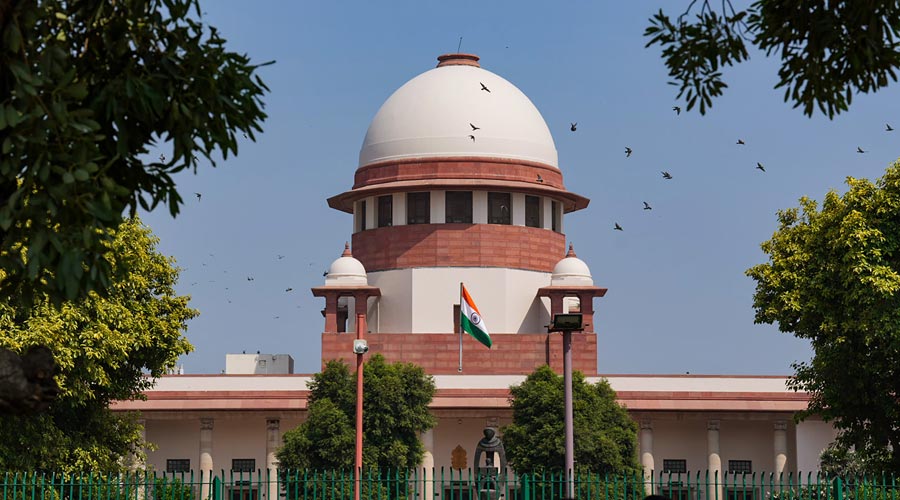
Adultery punishable in armed forces: Supreme Court
Additional solicitor-general Madhavi Divan tells bench that clarification was necessary as Armed Forces Tribunal had been relying on the 2018 judgment to quash disciplinary proceedings
R. Balaji | TT | New Delhi | 01.02.23 : A five-judge constitution bench on Tuesday clarified that armed forces personnel would continue to face court martial proceedings for adultery, stressing that the Supreme Court judgment of 2018 that decriminalised adultery applied only to civilians.
“It is not as if this court approved of adultery. It has found that it may be a civil wrong and will continue to be a ground for dissolution of marriage,” the bench of Justices K.M. Joseph, Ajay Rastogi, Aniruddha Bose, Hrishikesh Roy and C.T. Ravikumar said.
“The (2018) judgment of this court was concerned only with validity of Section 497 IPC (which criminalised adultery)…. In this (2018) case, this court had no occasion to consider the effect of the provisions of the armed forces acts.”
Sections 45 and 63 of the Army Act will, therefore, continue to make adultery an offence for both men and women personnel, punishable by dismissal from the force. (Section 497 of the IPC punished only adulterous men and not the adulterous women involved.)
The apex court’s clarification came on an application from the Centre that said the 2018 judgment in Joseph Shine vs Union of India, if applied to the armed forces, would hurt national security by affecting cohesion, discipline and morale in the forces.
Additional solicitor-general Madhavi Divan told the bench that the clarification was necessary as the Armed Forces Tribunal had been relying on the 2018 judgment to quash disciplinary proceedings against officers in adultery cases.
Divan argued that the Army Act’s provisions against adultery were necessary to ensure that personnel serving in farflung areas, away from their families, did not feel insecure or dispirited on account of possible adulterous relationships.
“It is not about Victorian morality. Mine is a simple case of military discipline, operational efficiency for the armed forces. It affects our security concerns,” she said.
“These are people who have to set an example, since they have to be ready to lose life and limb at your command. But the command structure gets disturbed if your boss behaves inappropriately.”
Divan stressed that while IPC 497 was discriminatory against men (one of the grounds on which Shine had successfully challenged it), the Army Act provisions against adultery were not.
Advocate Kaleeswaram Raj, who had appeared for Shine and was now representing certain aggrieved army personnel, pleaded that instead of saying the 2018 judgment would not apply to the armed forces, the court could consider instances of adultery in the military on a case-bycase basis.
But the bench ruled that the 2018 judgment would not apply to the army, navy or air force.
On September 27, 2018, a five-judge constitution bench had struck down as unconstitutional IPC 497 and CrPC 198(2), which made sexual intercourse between a married man and the wife of another man a criminal offence on the ground that it violated Articles 14 (equality), 15 (non-discrimination) and 21 (life and personal liberty).
While striking down these provisions as “manifestly arbitrary”, the apex court had endorsed a woman’s right to explore her own sexuality, saying she was not the “chattel” of a man.
Petitioner Shine, who hails from Kerala, had contended that IPC 497 was discriminatory since it punished an adulterous man with five years’ imprisonment but imposed no punishment on the adulterous woman.
It was also discriminatory against the wife of the adulterous man, he had argued. For, IPC 497 and CrPC 198(2), read conjointly, allowed only the husband of a woman in an adulterous relationship to file a complaint against the adulterous man. It did not allow the wife of the adulterous man to file a case against her husband or the other woman.
The 2018 judgment was delivered by a bench made up of the then Chief Justice, Dipak Misra, and Justices R.F. Nariman, A.M. Khanwilkar, D.Y. Chandrachud and Indu Malhotra.
That bench had refrained from interfering with the provisions of the Hindu Marriage Act or the personal laws of other religions, under which adultery is a ground for divorce.

0 Response to " Adultery punishable in armed forces: Supreme Court"
Post a Comment
Disclaimer Note:
The views expressed in the articles published here are solely those of the author and do not necessarily reflect the official policy, position, or perspective of Kalimpong News or KalimNews. Kalimpong News and KalimNews disclaim all liability for the published or posted articles, news, and information and assume no responsibility for the accuracy or validity of the content.
Kalimpong News is a non-profit online news platform managed by KalimNews and operated under the Kalimpong Press Club.
Comment Policy:
We encourage respectful and constructive discussions. Please ensure decency while commenting and register with your email ID to participate.
Note: only a member of this blog may post a comment.